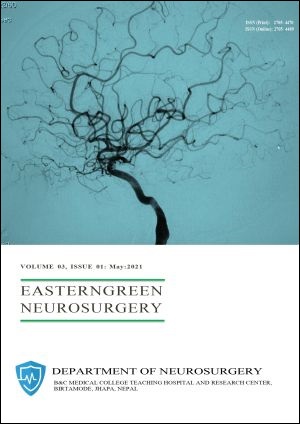Effect of Concomitant Extra cranial Injury in outcome of moderate and severe head injury patients admitted to a tertiary care hospital in western Nepal
DOI:
https://doi.org/10.3126/egn.v3i01.38929Keywords:
Glasgow Outcome Scale, Polytrauma, Traumatic Brain InjuryAbstract
Background: Polytrauma is a term used to describe the patients those are severely injured associated with other injuries (i.e. two or more severe injuries in at least two areas of the body), less often with a multiple injury (i.e. two or more severe injuries in one body area). More than 40% of the patient of Traumatic Brain Injury (TBI) dies due to extra cranial causes. We hypothesized that extra cranial injuries with polytrauma may alter TBI outcomes and perform the study.
Materials and methods: An analytical study was done with the patient of moderate to severe head injury admitted to neurosurgery Intensive Care Unit (ICU) of Manipal Teaching Hospital in between January to December 2019. The objective of the study was to assess the impact of concomitant extra cranial injury (Polytrauma) in the outcome of Moderate to severe head injury.
Results: In our study it is seen that, those individuals who have presented delayed in emergency department from the time of incidence under the influence of alcohol, likewise with mean Glasgow Coma Scale (GCS) below 8.16+/-3.22 and abnormal pupils, high injury severity score (ISS), and with polytrauma have poorer outcomes.
Conclusion: Concomitant extra cranial injuries, injury severity score(ISS),injuries associated under the influence of alcohol, delayed presentation in emergency after incident, GCS below 9 during presentation in ER and abnormal pupils during examinations are the strong predicting factors for the poor outcome of patient with traumatic brain injury.
Downloads
Downloads
Published
How to Cite
Issue
Section
License
Copyright (c) 2021 Pradeep Ghimire, Sushil Mishra, Balgopal Karmacharya, Nikunja Yogi

This work is licensed under a Creative Commons Attribution 4.0 International License.




